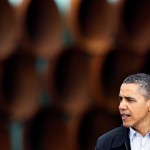Tar Sands to Texas: Will Keystone XL’s Heavy Crude Mean More Pollution?
Standing outside her tidy house in Pasadena, Texas, Patricia Gonzales succinctly sums up her community’s dilemma: “No one is saying we don’t want the jobs. It’s just that we don’t want the pollution coming with it.”
Her home is just two miles from the Houston Ship Channel, which is lined with the biggest concentration of petrochemical plants and oil refineries in the nation.
Gonzales was talking about her latest concern: the Keystone XL pipeline. If completed, it will bring millions of barrels of Canadian crude to refineries in Houston and Port Arthur. But the crude, from the tar sands mined in Alberta, is a heavier, dirtier variety than “sweet crude” from places like West Texas.
“We’re already in the highest level of the polluted [places in] the United States and you bring in more. And you want us to accept that?” Gonzales posed to StateImpact Texas.
The Canadians say they found just what they need on the Texas Gulf Coast: refineries that already are built to handle the heavy crude.
“They cost billions, tens of billions of dollars to build. You have that [refining] capacity in the Gulf Coast. It just doesn’t make any sense to make the tens of billions of dollars of investment [in Canada] when you have that capacity in the Gulf Coast,” said Alex Pourbaix, President of TransCanada, the company behind the Keystone pipeline.
Pourbaix was speaking March 6 at the IHS CERA energy conference in Houston. He was on a panel that touted how tar sands oil is already helping make Canada the leading country as a source of “foreign” oil for the United States, outpacing imported crude from Mexico, Saudi Arabia, Nigeria and Venezuela.
“Oil sands is already a very important source of oil supply for the United States. And we expect that to grow. Our outlook at IHS CERA is that oil sands will double in the next 10 years, go from 1.5 million barrels a day to over three million barrels a day,” said Jackie Forest with IHS CERA’s Calgary office.
ExxonMobil is reportedly among refineries in Texas already processing heavy crude and therefore likely to do much more from the Keystone XL pipeline. The world’s biggest publicly traded oil company has the nation’s biggest refinery in Baytown and another facility in Beaumont.
An ExxonMobil spokesperson refused to specify how much heavy crude the company’s refineries are already processing in Texas or might process if the pipeline is completed. Nor would the company respond to questions about how refining tar sands oil affects the amount of air pollution created by the plants.
That’s a big concern for environmental groups.
“You’re going to take existing capacity and put an even dirtier substance into it. Which means more stuff is going to have to come out,” said Matthew Tejada, an activist with Air Alliance Houston. The community group contends that the Texas Commission on Environmental Quality (TCEQ), the lead governmental agency for enforcing clean air laws in the state, is being too lenient and is ignoring public concerns.
“In Texas, we have built in such flexibility into all our permitting, into all our regulatory structures around those facilities that you’re not going to be able to say ‘boo’, you’re not going to be able to do anything about it…Once the crude gets here [from Canada] and those facilities have it, it’s probably going to fit right into their existing permits,” said Tejada.
The TCEQ disagrees.
“These facilities have emission limits and they are required to meet them, no matter what they’re refining. Any change in feedstock that would cause an increase in emissions above those limits will need to be authorized by a permit amendment,” wrote Terry Clawson, TCEQ spokesperson, in an email to StateImpact Texas.
Clawson also wrote that there are provisions for public input and for a review of potential health effects from increased pollution. He said the commission would, in any case, continue to monitor emissions and “take appropriate enforcement action when needed.”
In the case of the ExxonMobil refinery in Baytown, such action has already been needed. In an “enforcement order” issued last month, the TCEQ said the company had agreed to upgrade pollution monitoring equipment and to reduce air pollution emissions.






